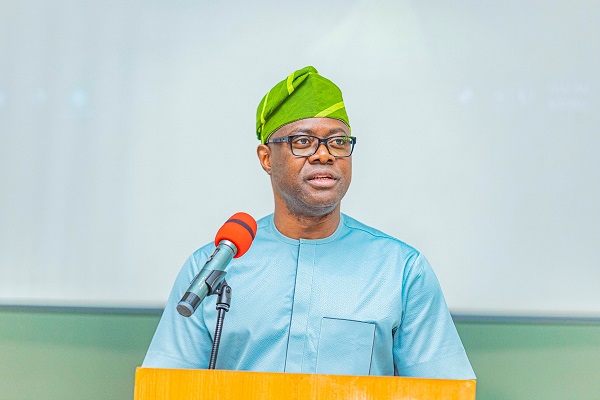As the debate over local government autonomy rages, Governor Seyi Makinde of Oyo State has chided the federal government for pointing fingers at state governments for getting additional funds from the federation account and misusing local government funds, describing it as a case of pot calling kettle black.
Makinde stated this while delivering his State of the State address on the floor of the state House of Assembly on Thursday.
Arguing that the three tiers of government—federal, state, and local—drew funds from the same federation account, he said it was curious that there was much noise about the funds accruing to states increasing, whereas the same increase in accrual would also apply to the federal government.
According to Makinde, rather than pointing fingers at subnational governments for the jack-up in funds accruing to them, the focus of government should be on how the country becomes more productive so as to address its challenges.
Makinde said: “This is always my argument with the federal government on autonomy for local governments: that governors are the ones misusing local government money; the governors are the ones getting additional money from federal allocation. It is a case of a kettle calling a pot black.
“Any money that comes into the federation account is shared between the federal government, state government, and local government. The federal government takes about 52 per cent of that money. If 28 per cent for states has suddenly gone up, what will happen to 52 per cent? We are taking from the same purse.
“We have exchange rate problems. Naira to dollar has gone to this extent, but the bottom line is that you cannot fix those challenges unless we become productive. All the multinationals are leaving; the industrial manufacturers are also not comfortable; they are leaving.
“You have to engage the people; you have to let them know that this is temporary; at some point, we will turn the corner, rather than pointing fingers at the fact that this level of government is getting more money from the purse. We need to be productive. It is productivity that will solve the problem for us.”
The address saw Makinde reel out his achievements and plans in education, health, security, infrastructure, agribusiness, tourism, and solid mineral development.
In education, Makinde said the state would be investing N15 billion a year in school infrastructure to reduce the infrastructure deficit of about N50 billion within the next three years.
He said the education intervention will begin with 70 public primary and secondary schools across the state, with renovation works to be done in select schools during the next long-term break.
As Makinde said, he had approved the recruitment of 7,000 secondary school teachers, aside from the earlier approval that 7,000 teachers and 100 carers be recruited in public primary schools in the state.
Makinde said: “With your approval, Mr Speaker, I appointed a special adviser on education interventions. He has been mandated to conduct NEEDS assessments for public primary and secondary schools in the state to identify schools for infrastructural interventions. You will also recall that starting with the 2024 budget, we allocated N15 billion annually for infrastructural renewal, fixing classrooms, and basic infrastructure in public primary and secondary schools in the state. This, along with consistent payment of the Universal Basic Education Commission (UBEC) intervention counterpart funding, would help us significantly reduce the infrastructural deficit in our public schools.
“The deficit that we have is between N40 billion and N50 billion. In most of our schools, you have no fence, roofs that have collapsed, and some of our children sit on the floor to learn. So if we continue spending N3 billion from UBEC interventions and government counterpart funding of about N3 billion, it will take at least 15 years to close the gap.
“We are quite aggressive. We want to close this gap in three years, starting this year. That means we will spend N15 billion every year consistently outside of UBEC/SUBEB interventions. We are starting with about 70 schools. Once our students go on holiday, by the time they come back for the first term of the next academic year, the 70 schools will have completely eliminated any infrastructural deficit.
“We have also approved the recruitment of 7,000 into Oyo State public primary schools and 100 carers. I think the portal is open. And two days ago, I approved the recruitment of 7,000 secondary school teachers.”
In road infrastructure, Makinde listed roads completed within the past year totaling 152.92 kilometres, assuring that the ongoing reconstruction of the Ido-Eruwa road will be of the highest standard.
Yielding to calls to fix inner roads in the state, Makinde said he had mandated chairmen of local government areas to each fix 30 kilometres of rural roads in their domains.
Makinde said the funds for the projects were already sitting in the respective accounts of the local government areas, to indicate that work would soon commence.
This, he said, is apart from the fact that fixing 1,000 kilometres of rural roads would soon commence under the Rural Access and Agricultural Marketing Project (RAAMP).
He said that with the many road construction projects, Oyo State was on track to become an agribusiness and industrial hub for the region.
Makinde said the economic advancement in the state is evident in the increase in the internally generated revenue (IGR) of the state from an average of N4.2 billion monthly in 2023 to N4.95 billion in the first quarter of 2024.
ALSO READ THESE TOP STORIES FROM NIGERIAN TRIBUNE
